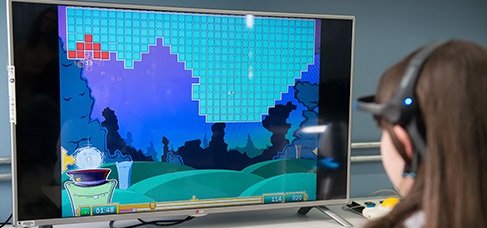The Graduate Degree Program in Cultural Diversity and Social Inclusion investigates interfaces between state, social movements, languages, economics, infomation technology, public policy e social inclusion, without losing sight of the homogenization processes and cultural heterogeneity characteristic of societies contemporary.

Concentration Area: Diversity and Inclusion
The concepts of Diversity and Inclusion require advanced studies, for the construction of a specific theoretical corpus, either to support an interdisciplinary field of knowledge. In this contexto, it is proposed the area of concentration in Diversity and Inclusion, aiming to integrate investigative practice aspects of economic and social order thar are interwoven in the way that the subjects, goups, institutions, governments and organizations build representations of self and others, like produce discourses, Affirm dentity and give meaning and concreteness to their actions, it is manifest in micro or macro-social level. When looking for Diversity, seeking inclusion, is considered thes interfaces between state, social movements, languages, economics, information technology, public policy and social inclusion, with out losing sight of the homogenization and heterogeneity cultural process, characteristics of contemporary societies.
Target Audience
Based on its interdisciplinary nature, the Program (Master and Doctorate) meets the interest and the demand of graduates coming from different areas, among them: Humanities and Social Sciences, Applied Social Sciences, Health and Technological Sciences, as long as the research proposal presents adherence the Program’s area of emphasis and lines of research.
Areas of Expertise
Developing the interdisciplinary character, the Program (Master and Doctorate) meets the interest and demand of outputs from different areas, such as: human and social sciences, applied social sciences, health and technological sciences, as long as the research proposal adheres to the area of expertise and the research lines of the program.

Professional profile
Through the concentration area, fields of research and its objectives, the Graduate Program in Cultural Diversity and Social Inclusion aims at the training of researchers with scientific competence to:
- the development of research in the concentration area of Diversity and Inclusion, from the fields of research in Languages and Technologies, Social Inclusion and Public Policies, Health and Social inclusion;
- the critical analysis, proposal and evaluation of programs related to the diversity and social inclusion/exclusion themes;
- the recognition of the complexity that involves diversity and the exclusion/inclusion processes to the proposition of projects and interdisciplinary actions, in order to meet demands related to these topics;
- the critical reading of public policies related to diversity and social inclusion and qualified training for the construction of articulation networks among the university, social movements and public authorities, in order to contribute to the formulation of public policies in this field;
- to deepen research about social practices, through dialogue between language and technologies and their relationship with adversity and the exclusion/inclusion processes in contemporary society;
- the reflection and elaboration of projects and actions on the diversity and inclusion themes capable of articulating the activities of teaching, research and extension;
- the ability to analyze and criticize social, historic, cultural and technological context from a pluralistic and articulated angle with the various fields of knowledge;
- development of advanced research in Diversity and Inclusion, as well as teaching activities that result, in scientific knowledge, an articulated view of these themes.
Background
The Postgraduate Program in Cultural Diversity and Social Inclusion was recommended by CAPES, through Official Letter No. 255-19 / 2012 / CTC / CAAIII / CGAA / DAVCAPES, on November 27, 2012, and academic activities Beginning March 2013.
The general purpose of the program is to produce advanced knowledge in the field of diversity and social inclusion of individuals and groups, based on an understanding of social organization, identity processes and cultural manifestations, health and quality of life, in order to train professionals to be able to intervene, through scientific knowledge, in the defense of diversity and social inclusion, individual and collective rights, participatory processes and public policies.
The program focuses on the socioeconomic, cultural and environmental problems of the Sinos River Valley/RS, mainly due to disordered forms of urbanization, industrial changes and their environmental or social impacts, predatory workforce consumption and their precariousness, and high levels of social exclusion.
The interdisciplinary perspective of the proposal is in line with regional social demand. The Program is organized around one area of emphasis - Diversity and Inclusion - and three Lines of Research: Health and Social Inclusion; Languages and Technologies; Social Inclusion and Public Policies.
Coordination committee
Coordinator: Rosemari Lorenz Martins.
Substitute coordinator: Débora Nice Ferrari Barbosa.
Teaching Representative: Dinora Tereza Zucchetti.
Teaching Representative: Rosemari Lorenz Martins.
Teaching Representative: Geraldine Alves dos Santos.
Master’s Student Representative: Débora Taís Arnhold.
PhD student representative: Tais Prass Cardoso.
Self-evaluation Committee
Teaching Representative: Gustavo Roese Sanfelice e Everton Rodrigo Santos.
Student Representative: Mauricio Barth.
Egress Representative: Inês Caroline Reichert.
Admnistrative Technician Representative: Raquel Helene Kleber.
PhD
PNPD/CAPES Scholarship
The PNPD is an institutional policy that finances post-doctoral stages in Stricto Sensu Graduate Programs recommended by CAPES and aims to promote high-level studies, strengthen national research groups, renew cadres in the Post-Graduate Programs higher education and research institutions, and encourage Brazilian and foreign researchers to enter the Postdoctoral stage, stimulating their integration with research projects developed by Graduate Programs in the country.


